Personality Traits of Adult British Shorthairs: Secret Guide
Quick Summary: British Shorthairs are known for their calm and affectionate nature. They’re typically independent but enjoy companionship, making them ideal for families and individuals alike. These cats are playful without being overly demanding, and they adapt well to indoor living. Remember, each cat is unique, so individual personalities can vary.
Bringing a British Shorthair into your home means welcoming a furry friend known for its easygoing temperament. But what exactly can you expect from their personality as they grow into adulthood? Understanding the common traits of this breed can help you prepare for a happy life together. It’s also important to remember that while breed characteristics offer a general guide, every cat is an individual. Let’s explore the delightful world of British Shorthair personalities!
Understanding the British Shorthair Personality
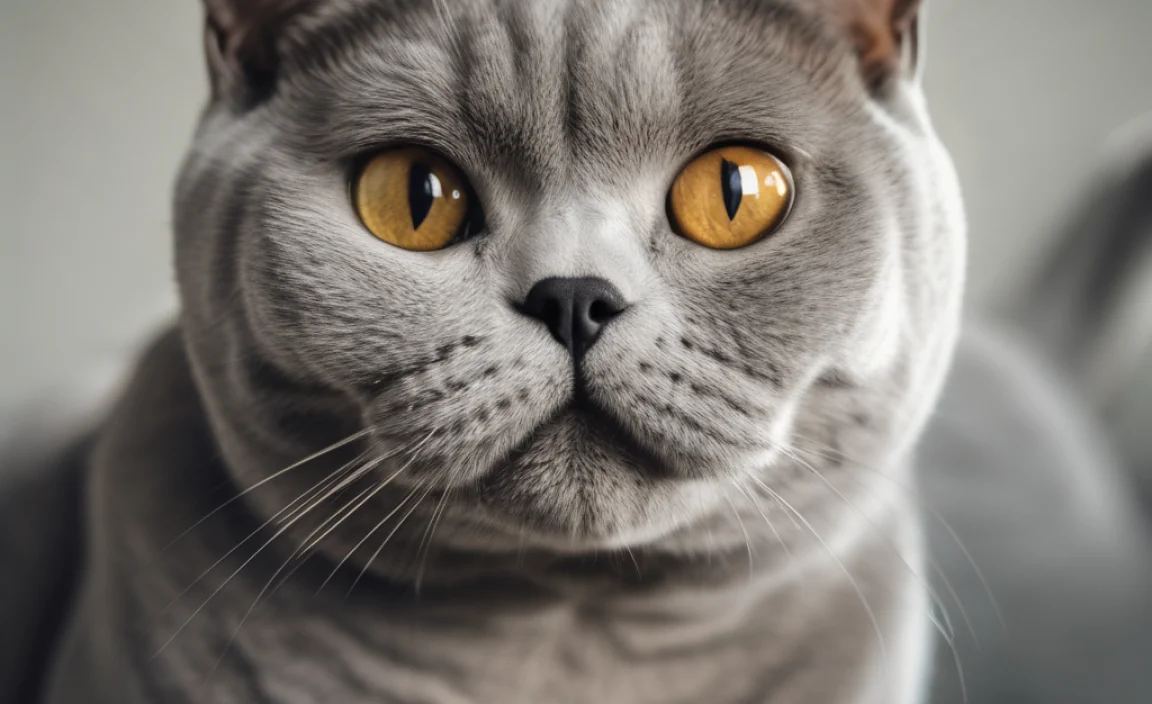
British Shorthairs are often described as gentle giants. They possess a unique blend of independence and affection, making them wonderful companions. Let’s dive into some key personality traits you might observe in your adult British Shorthair.
Affectionate but Independent
One of the most endearing qualities of the British Shorthair is their balanced approach to affection. They enjoy being around their owners and will often follow you from room to room, but they’re not usually demanding of constant attention. They are more than happy to nap nearby, offering a comforting presence without being overly clingy. This makes them a great choice for people who work from home or have busy lifestyles but still want a loving companion.
Calm and Relaxed Demeanor
British Shorthairs are known for their calm and relaxed nature. They aren’t typically high-strung or easily agitated, which contributes to their reputation as excellent family pets. They tend to take things in stride, making them adaptable to various home environments. This laid-back attitude extends to their interactions with children and other pets, especially if they are introduced to them early in life. According to the RSPCA, early socialization is key to a well-adjusted cat.
Playful Without Being Hyperactive
While not as intensely playful as some other breeds, British Shorthairs do enjoy playtime. They appreciate interactive toys like feather wands or puzzle feeders. Their play sessions are often punctuated by periods of rest, reflecting their moderate energy levels. Providing them with scratching posts and climbing structures can help satisfy their natural instincts and keep them entertained. Remember to engage them in regular play to keep them physically and mentally stimulated.
Intelligent and Trainable
British Shorthairs are intelligent cats that can be trained using positive reinforcement techniques. They can learn simple commands and tricks, especially when motivated by treats or praise. Training can also be a great way to bond with your cat and provide mental stimulation. Clicker training, in particular, can be effective for teaching them new behaviors. Consistency and patience are key to successful training.
Not Lap Cats (Usually)
While every cat is an individual, British Shorthairs aren’t typically known for being lap cats. They prefer to sit next to you rather than on you. They enjoy being close to their owners, but they often value their personal space. This doesn’t mean they don’t love affection; they simply express it in their own way. Many will happily accept scratches behind the ears or a gentle cuddle on the couch.
Factors Influencing Personality
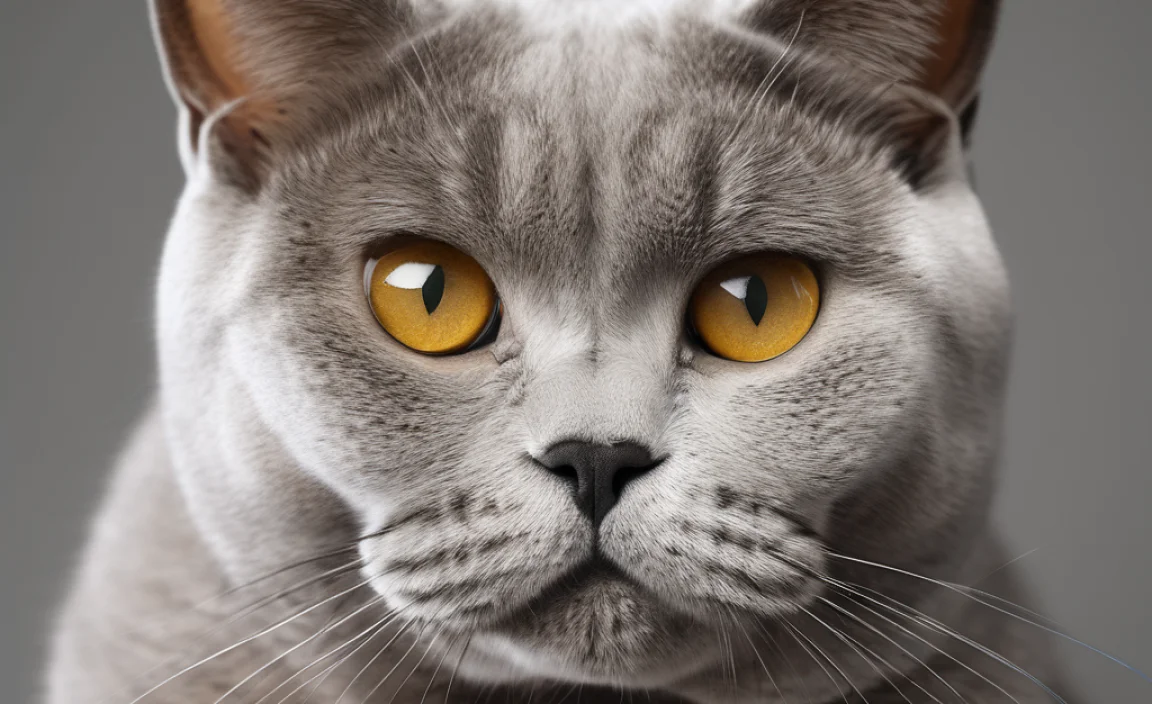
While breed characteristics provide a general framework, several factors can influence the individual personality of a British Shorthair. Understanding these factors can help you better appreciate and cater to your cat’s unique needs.
Genetics and Breeding
Genetics play a significant role in shaping a cat’s personality. Responsible breeders carefully select breeding pairs based on temperament as well as physical traits. Kittens from calm and friendly parents are more likely to inherit those qualities. When choosing a British Shorthair, look for breeders who prioritize temperament and socialization.
Early Socialization
Early socialization is crucial for developing a well-adjusted and confident cat. Kittens should be exposed to a variety of sights, sounds, people, and experiences during their first few months of life. This helps them become more adaptable and less fearful as adults. According to the The International Cat Association (TICA), kittens should remain with their mother and littermates until they are at least 12 weeks old to ensure proper socialization.
Environment and Upbringing
The environment in which a cat is raised can also influence its personality. A calm and stable home environment can help a cat feel secure and relaxed. Conversely, a stressful or chaotic environment can lead to anxiety and behavioral issues. Providing your British Shorthair with plenty of safe spaces, such as cat trees or cozy beds, can help them feel more secure. Positive interactions and consistent routines also contribute to a happy and well-adjusted cat.
Health and Well-being
A cat’s physical health can significantly impact its personality. A cat in pain or discomfort may become withdrawn, irritable, or even aggressive. Regular veterinary checkups are essential for maintaining your cat’s health and detecting any potential problems early on. Addressing any health issues promptly can help ensure that your cat remains happy and comfortable.
Adapting to Your British Shorthair’s Personality
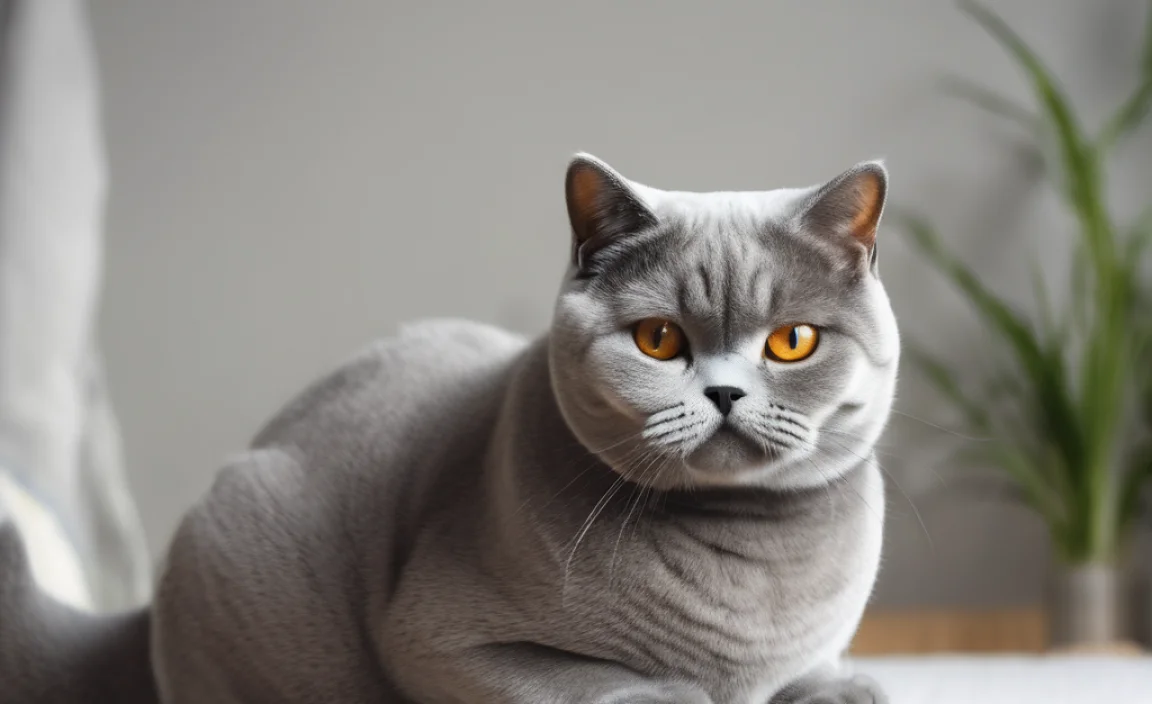
Every British Shorthair is an individual, and it’s important to adapt your approach to their unique personality. Here are some tips for creating a harmonious relationship with your feline friend.
Provide Plenty of Space
British Shorthairs appreciate having their own space. Provide them with multiple resting spots where they can retreat when they want to be alone. Cat trees, window perches, and cozy beds are all great options. Make sure these spaces are easily accessible and located in quiet areas of your home.
Respect Their Independence
If your British Shorthair isn’t a lap cat, don’t force them to be. Respect their preference for personal space and allow them to come to you when they’re ready for affection. Gentle petting and verbal praise can be just as rewarding as a cuddle on your lap.
Engage in Regular Play
While British Shorthairs aren’t hyperactive, they still need regular playtime to stay physically and mentally stimulated. Interactive toys, such as feather wands and laser pointers, are great for engaging their hunting instincts. Puzzle feeders can also provide mental enrichment and slow down their eating. Aim for at least 15-20 minutes of playtime each day.
Be Patient and Understanding
It takes time to build a strong bond with any cat. Be patient and understanding as your British Shorthair adjusts to their new home and learns to trust you. Avoid forcing interactions and allow them to come to you on their own terms. With time and patience, you’ll develop a loving and rewarding relationship.
Common British Shorthair Behaviors and How to Interpret Them
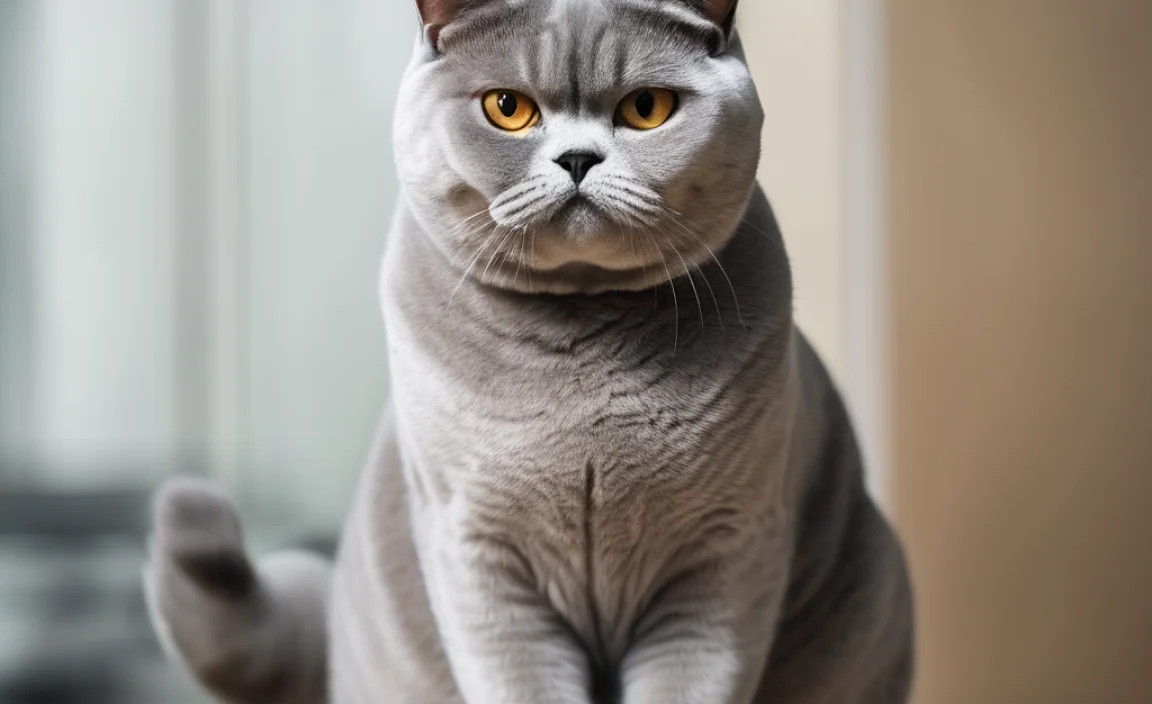
Understanding your British Shorthair’s behavior is crucial for building a strong bond and addressing any potential issues. Here are some common behaviors and what they might mean.
Kneading
Kneading, also known as “making biscuits,” is a common behavior in cats. They push their paws into a soft surface, such as a blanket or your lap, often while purring. This behavior is thought to be a remnant of kittenhood when they would knead their mother’s belly to stimulate milk flow. In adult cats, kneading is a sign of contentment and relaxation.
Slow Blinking
A slow blink is a cat’s way of showing affection and trust. When a cat slowly blinks at you, they are essentially saying, “I trust you and feel comfortable around you.” You can reciprocate this gesture by slowly blinking back at them.
Head Bunting
Head bunting, or rubbing their head against you, is a way for cats to mark you with their scent. They have scent glands on their forehead, cheeks, and chin, and when they rub against you, they are transferring their scent onto you, claiming you as part of their territory. This is a sign of affection and bonding.
Bringing Gifts
Some cats enjoy bringing their owners “gifts,” such as dead mice or birds. While this behavior may seem unpleasant, it’s actually a sign of affection. Cats are natural hunters, and they may see you as part of their family. Bringing you a gift is their way of sharing their bounty and showing that they care for you.
Hiding
If your British Shorthair is hiding, it could be a sign that they are feeling stressed, anxious, or unwell. Cats often retreat to a safe place when they are feeling vulnerable. If your cat is hiding more than usual, it’s important to identify the cause of their stress and address it. Providing them with a quiet and comfortable space where they can feel safe can also help.
British Shorthair Personality: Common Myths Debunked
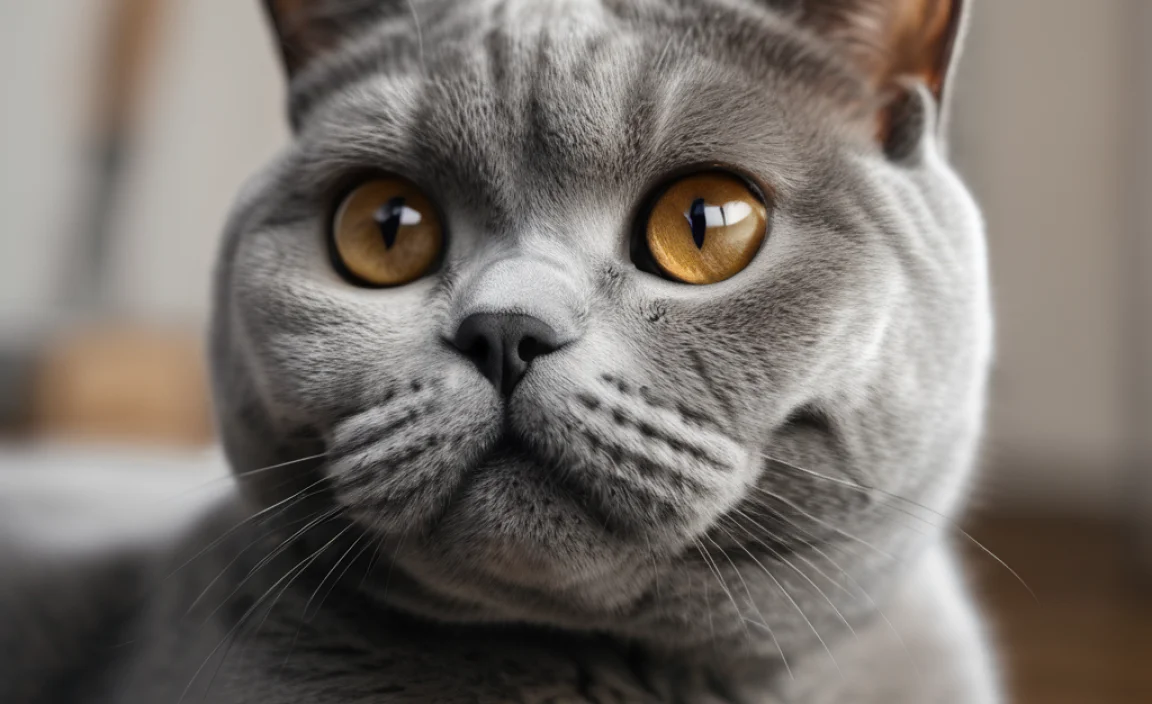
There are several myths surrounding the British Shorthair personality. Let’s debunk some of the most common ones.
| Myth | Reality |
|---|---|
| British Shorthairs are aloof and unfriendly. | British Shorthairs are affectionate but independent. They enjoy being around their owners but aren’t overly demanding of attention. |
| British Shorthairs are lazy and inactive. | British Shorthairs have moderate energy levels and enjoy playtime, but they also appreciate rest. |
| British Shorthairs are not intelligent. | British Shorthairs are intelligent cats that can be trained using positive reinforcement techniques. |
| All British Shorthairs are the same. | Every cat is an individual, and British Shorthairs can have a wide range of personalities. |
British Shorthair vs. Other Breeds: Personality Comparison
Understanding how the British Shorthair personality compares to other breeds can help you determine if this breed is the right fit for you. Here’s a brief comparison.
- British Shorthair vs. Persian: Both breeds are known for their calm and relaxed demeanor, but Persians tend to be more lap cats than British Shorthairs.
- British Shorthair vs. Siamese: Siamese cats are much more vocal and demanding of attention than British Shorthairs. They also have higher energy levels and require more stimulation.
- British Shorthair vs. Maine Coon: Maine Coons are known for their friendly and outgoing personalities, but they also require more grooming than British Shorthairs.
- British Shorthair vs. Ragdoll: Ragdolls are known for their docile and gentle nature, often going limp when held. British Shorthairs are affectionate but typically prefer not to be carried.
Tips for a Happy British Shorthair
Here are some tips to ensure your British Shorthair leads a happy and fulfilling life:
- Provide a balanced diet: Feed your British Shorthair high-quality cat food appropriate for their age and activity level.
- Ensure regular vet check-ups: Schedule annual check-ups to monitor their health and catch any potential issues early. According to the Cornell Feline Health Center, preventative care is key to a long and healthy life.
- Offer plenty of playtime: Engage them in regular play sessions to keep them physically and mentally stimulated.
- Create a comfortable environment: Provide them with a safe, quiet, and comfortable home environment.
- Show them love and affection: Spend quality time with your cat, offering gentle petting, verbal praise, and attention.
FAQ About British Shorthair Personality
Are British Shorthairs good with children?
Yes, British Shorthairs are generally good with children. Their calm and patient nature makes them well-suited to family life. However, it’s important to supervise interactions between cats and young children to ensure that both are respectful of each other.
Do British Shorthairs get lonely?
While British Shorthairs are independent, they still need companionship. They can get lonely if left alone for long periods. Providing them with plenty of toys and enrichment can help, but it’s also important to spend quality time with them each day.
Are British Shorthairs destructive?
British Shorthairs are not typically destructive. However, like all cats, they need scratching posts to satisfy their natural scratching instincts. Providing them with appropriate outlets for their behavior can help prevent them from scratching furniture.
How much grooming do British Shorthairs need?
British Shorthairs have a dense coat that requires regular grooming. Brushing them a few times a week can help prevent matting and reduce shedding. During shedding season, you may need to brush them more frequently.
Are British Shorthairs vocal cats?
British Shorthairs are not typically vocal cats. They are relatively quiet and don’t tend to meow excessively. However, they may meow to greet you or to let you know that they want something.
Do British Shorthairs like to be held?
While some British Shorthairs enjoy being held, many prefer not to be. They are more likely to want to sit next to you rather than on you. Respect their preferences and allow them to come to you when they’re ready for affection.
Are British Shorthairs prone to any health issues?
British Shorthairs are generally healthy, but they can be prone to certain health issues such as hypertrophic cardiomyopathy (HCM) and polycystic kidney disease (PKD). Regular veterinary checkups can help detect and manage these conditions.
Conclusion
The British Shorthair is a delightful breed known for its calm, affectionate, and adaptable nature. While they possess distinct personality traits, remember that each cat is an individual with its own unique quirks and preferences. By understanding the general characteristics of the breed and paying attention to your cat’s individual needs, you can create a loving and fulfilling relationship that will bring joy to both of your lives. With patience, understanding, and plenty of love, you and your British Shorthair can enjoy many happy years together.



